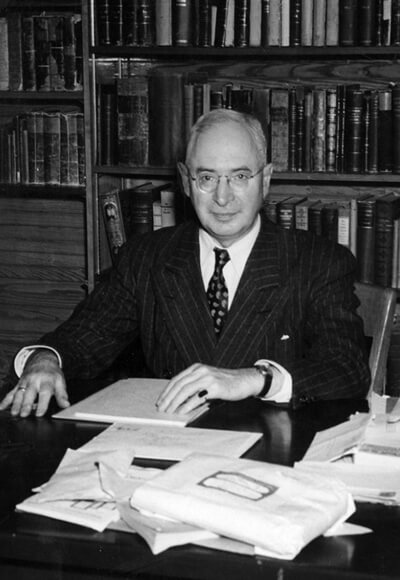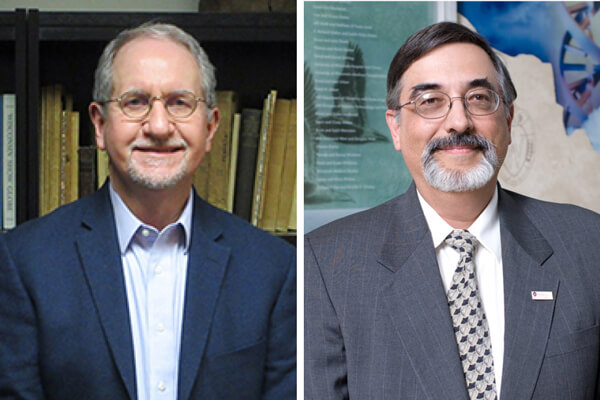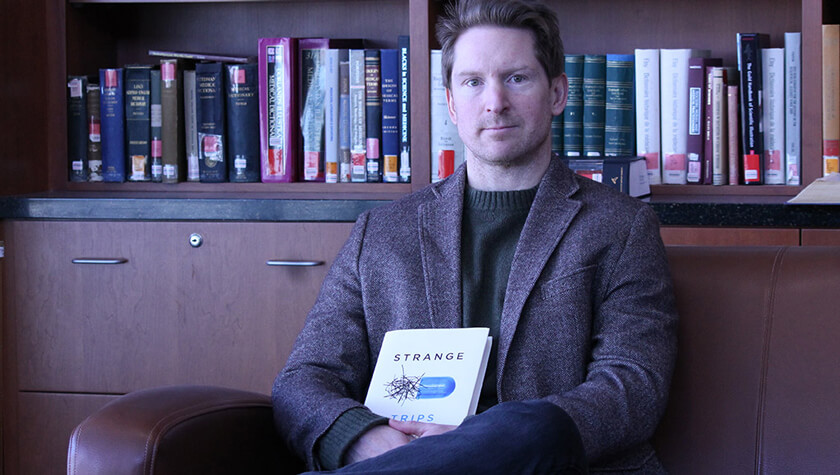Lucas Richert joins the School as the George Urdang Chair in the History of Pharmacy
By Katie Gerhards
Small cork-topped bottles filled with colored powders, old-fashioned scientific instruments, framed black-and-white photos of pharmacists tinkering in their labs, and clips of the history that contextualize them are preserved in display cases on the first floor of the University of Wisconsin–Madison School of Pharmacy.
These cases hold pieces of the profession’s past, but they also hint at a more localized history — the longstanding relationship between the School and the American Institute of the History of Pharmacy (AIHP).
AIHP has been housed in the School of Pharmacy since it was founded in 1941 and, though they remain independent entities, the two share a close relationship. One of the many threads weaving the institutions together is the George Urdang Chair in the History of Pharmacy — the first endowed chair of its kind — to be held by an outstanding scholar and educator who would continue to strengthen the collaboration between the School and AIHP and support the ongoing mission to protect, record, and share the history of pharmacy.
Lucas Richert, who comes to the School from the University of Strathclyde in Glasgow, Scotland, where he was a Chancellor’s Fellow in History, has newly joined the School and AIHP to take on the challenge. As the Urdang Chair, Richert serves as an associate professor in the School’s Social and Administrative Sciences Division, as well as historical director of AIHP, where he will oversee and continue to build the historical programming and scholarly work, including AIHP’s journal, Pharmacy in History.
“[Dr. Richert] brings a great breadth and depth of knowledge on the intersection of drugs, society, and government.” –Dean Steve Swanson
“We are thrilled that Dr. Richert has joined our School as a faculty member and historical director of the American Institute of the History of Pharmacy,” says School of Pharmacy Dean Steve Swanson. “He brings a great breadth and depth of knowledge on the intersection of drugs, society, and government. We are also happy that a scholar of Luc’s quality will contribute his unique skills as a researcher and historian of health care to our Social and Administrative Sciences Division.”
Richert’s historical roots
Richert grew up in Saskatchewan, Canada, which is where he first fell into the study of history — interestingly, it was the history of the United States that caught his focus.
“Canadian-American relations piqued my curiosity early on,” he says. “I was intrigued by what it is that separates us and what makes us the same.”
One of the differentiators that jumped out to him is the way in which pharmaceuticals were researched, marketed, and sold to Canadians and Americans. “From that narrow starting point, my research broadened out to the politics of pharmaceutical regulation through the Food and Drug Administration,” Richert says.

From Canada, he headed to the United Kingdom, where he first earned his master’s degree from the University of Edinburgh and then went on to earn a PhD in the history of the U.S. pharmaceutical industry from the University of London. After the publication of his first book, Conservativism, Consumer Choice, and the Food and Drug Administration During the Reagan Era: A Prescription for Scandal, the focus of his work slowly began to evolve to where it is today: exploring the intersection of legitimate and illicit drugs. Richert’s latest book, Strange Trips: Science, Culture, and the Regulation of Drugs, which was released this spring, delves into that overlap and illuminates how political climates and societal factors influence the way we think about drugs and medications.
As an associate professor, Richert hopes to offer historical context and case studies to help student pharmacists understand how medications like MDMA and LSD have occupied both medical and illegal spaces, especially as there is a resurgence of research into the therapeutic potential of psychedelics.
“Dr. Richert’s focus on the history of pharmaceuticals versus the history of pharmacy opens up new opportunity for both the School and AIHP,” says Dave Mott (BS ’88, MS ’92, PhD ’95), professor and chair of the Social and Administrative Sciences Division. “There’s a lot of momentum behind him.”
“The School of Pharmacy and AIHP have a really important relationship that has secured the UW–Madison School of Pharmacy’s spot as a leader in the history of pharmacy,” says Richert. “Part of my job is to build on the amazing legacy of AIHP and get it more involved in the daily life of the School and the education of its students.”
Innovating to preserve pharmacy’s past
When they first arrived in Madison in 1939, George Urdang and his wife, Gertrude, rented a single unfurnished room near the University of Wisconsin campus. The Urdangs emigrated from Germany following correspondence with Edward Kremers, former director of the UW Department of Pharmacy who had long been an outspoken advocate of a well-rounded liberal arts education for all professional students.
“The School of Pharmacy and AIHP have a really important relationship that has secured the UW–Madison School of Pharmacy’s spot as a leader in the history of pharmacy.” –Lucas Richert
“The professional student should at least have a fair knowledge of the history of his profession,” Kremers declared at the 1892 meeting of the American Pharmaceutical Association. In 1907, he pioneered the first-ever elective class about the history of pharmacy, which continues to be offered at the UW–Madison School of Pharmacy.
Kremers and Urdang shared a vision for a center devoted to the history of pharmacy. “I propose again the title ‘American Institute of the History of Pharmacy,’” Urdang wrote to Kremers. “I cannot see any other way to fulfill our duty toward the History of Pharmacy in this country.”

With the help of Kremers and several other faculty members from the UW–Madison School of Pharmacy, Urdang realized his vision in 1941 and served as the founding director of AIHP. In 2009, nearly 50 years after Urdang’s passing, Robert Buerki (BS ’63, MS ’67) and his wife, Leslie, established a fund to ensure the study of pharmacy’s history would always have a place at the School of Pharmacy.
When longtime Executive Director Greg Higby (MS ’80, PhD ’84) retired in 2018, AIHP’s board of directors used the opportunity to restructure the roles and give the Urdang Chair oversight of the institute’s scholarly endeavors, including historical programming, and the administrative role to Dennis Birke, now AIHP’s executive director.
Higby’s leadership helped put AIHP on the map for Richert. “We had been acquainted at conferences when I was a PhD student, and he was extremely kind and introduced me to other people who would be good to know in my field,” says Richert. With Higby as the face of the institute, Richert knew it was something he wanted to be a part of.
Looking toward the future
“This is a thrilling time for the institute, with Richert bringing immense creativity, enthusiasm, and energy to historical programming,” says AIHP President William Zellmer (BS ’67). “We’re well-positioned to grasp the handoff from recently retired Executive Director Higby and continue to enrich the intellectual lives of members and serve the field of pharmacy history with deep commitment and integrity.”
Among Richert’s top priorities for AIHP is upgrading the institute’s extensive collections to make them more accessible to researchers by getting it online.
“There are literally thousands of folders filled with information about people who have worked in the profession, contributed to research, or made a discovery, and researchers who may be trying to investigate the origins of a particular medicine would find this information very valuable,” says Birke.

AIHP frequently fields reference requests about its historical collection from interested researchers, and by making these documents more accessible, the Institute could help research progress that much more quickly.
“Our mission is to advance knowledge and understanding of the history of pharmacy and medicines,” says Birke. “One of the ways we do that is through our collection of historical materials, but another way is through our programming, so with Richert on board we’re looking to elevate our activities in both of these areas.”
Although AIHP is an organization independent of the School, the relationship between both entities is close and is one of the resources that sets the School apart.
Zellmer, who in addition to his role at AIHP is also president of Pharmacy Foresight consulting and worked for the American Society of Health-System Pharmacists for nearly 40 years, has been a member of AIHP since he was a pharmacy student at the School, which he says allowed him to make the study of pharmacy’s history a pleasurable, career-long pursuit.
“One of the great blessings of my education at the UW–Madison School of Pharmacy was the opportunity to begin learning pharmacy history under the tutelage of Professors Glenn Sonnedecker (MS ’50, PhD ’53) and Ernst Stieb (PhD ’59),” says Zellmer. “They helped me understand that knowledge of pharmacy history is an absolute requirement for influencing the future direction of this field.”
At the School of Pharmacy, that future is looking bright.
Learn more about Dr. Richert’s new book, Strange Trips.
Read how Edward Kremers revolutionized pharmacy education and introduced the study of history at the School of Pharmacy.